
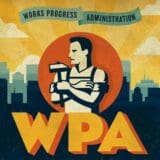
 The question we must ask today, as we remember the Works Progress Administration is: Why isn’t there the political will to take dramatic steps to address today’s jobs emergency?
The question we must ask today, as we remember the Works Progress Administration is: Why isn’t there the political will to take dramatic steps to address today’s jobs emergency?
Let’s start with the obvious; there was a far greater share of Americans unemployed in the Great Depression. In 1934, unemployment peaked at 24.9 percent. One-out-of-four people officially out of work is much more of a crisis than one-out-of ten (9.6 percent), the peak in the current recession in 2010. The impact is even greater than two-and-a-half times, as such a huge drop in consumer spending means that marginal businesses able to survive 10 percent unemployment rates were swept away in the Depression. And during the Depression – much more than now – it was impossible not to know people whose lives had been devastated.
The other obvious difference is that we have cushioned the impact on the unemployed through the establishment of New Deal programs,
» Read more about: The WPA Turns 78 — Where’s Our Version Today? »
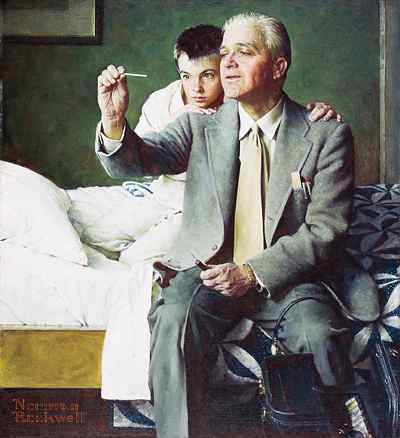

“I remember my Mom’s heartbreak when she could not afford to give my younger brother the treatment he needed when we learned he had a hip disease,” the man said. “It was my Mom – the wife of a WWII veteran — who taught me something I still believe today: This country is the greatest in the world. America’s greatness is largely because of how we value the weakest among us. Quality healthcare services must be accessible and affordable for all – not just those in certain ZIP codes or tax brackets.”
That’s music to the ears of progressives, maybe even Top-40ish in its soothing, harmonious familiarity. The dissonant note is who actually spoke the words: Rick Scott, the Republican governor of Florida, who swept into office on an uncompromising anti-Obama, stop-health-care-reform platform, and was one of the first to sign on to lawsuits challenging the constitutionality of the Affordable Care Act (ACA).
» Read more about: Medicaid: Conservatives Get Flexible (Sort Of) »


A black man—Barack Obama—sits in the Oval Office. A black woman—Oprah Winfrey—joins Warren Buffett and Bill Gates on the Forbes magazine list of richest individuals in the world. A black couple—Jay-Z and Beyonce—own a basketball team and buy an $80,000 diamond-encrusted Barbie doll for their one-year-old daughter. With such examples of impressive success and vulgar excess it’s easy to think that America’s long history of racial inequality has come to an end.
But then along comes a Brandeis University study showing that even as racial inequalities in terms of education and income have narrowed, the gap in wealth between black and white families has dramatically widened. Between 1985 and 2009, the gap in wealth between white and black families nearly tripled. It may be tempting to imagine that poor choices or lack of a work ethic can explain the disparity, but the study found that for the most part, the wealth gap is not the result of differences in education,
» Read more about: The Winner-Take-All Economy: A Black and White Story »
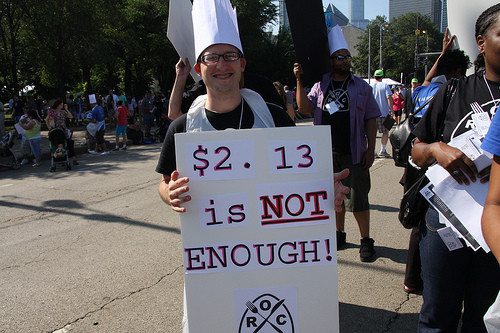
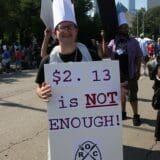
For Merleane S., a 19-year-old, single mom, her work shift on March 15 included taking and filling orders at a fast food restaurant in Palm Coast, Florida. She was earning the state’s minimum wage of $7.79 per hour. Similar to other U.S. workers, she was trying to make sure her family was secure.
That same day, in the nation’s capital, lawmakers in the U.S. House of Representatives unanimously voted against an amendment to H.R. 803, a job training bill. That amendment would have gradually increased the federal minimum wage from $7.25 an hour to $10.10 an hour by the end of 2015.
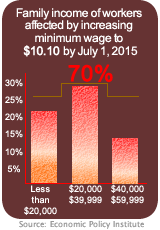 The amendment marked one of the most recent efforts regarding an issue that is gaining momentum nationally — an increased minimum wage. If the idea is approved, it would affect millions of workers across the income spectrum, including the middle class.
The amendment marked one of the most recent efforts regarding an issue that is gaining momentum nationally — an increased minimum wage. If the idea is approved, it would affect millions of workers across the income spectrum, including the middle class.
Merleane,
» Read more about: Not Only the Poor Benefit from Raised Minimum Wage »
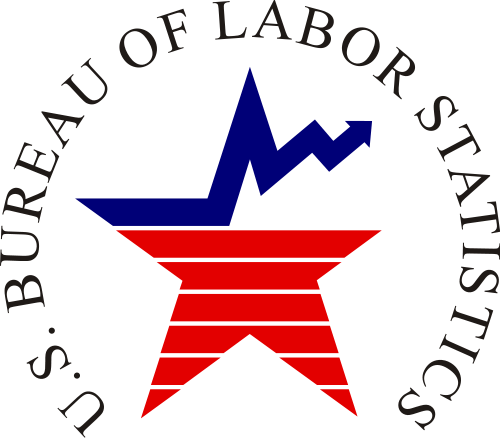
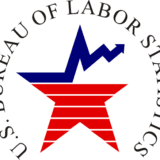
 Bad news on the economy. It added only 88,000 jobs in March – the slowest pace of job growth in nine months.
Bad news on the economy. It added only 88,000 jobs in March – the slowest pace of job growth in nine months.
While the jobless rate fell to 7.6 percent, much of the drop was due to the labor force shrinking by almost a half million people. If you’re not looking for work, you’re not counted as unemployed.
That means the percentage of working-age Americans either with a job or looking for one dropped to 63.3 percent — its lowest level since 1979.
The direction isn’t encouraging. The pace of job growth this year is slower than its pace last year.
What’s going on? The simple fact is companies won’t hire if consumers aren’t buying enough to justify the new hires. And consumers don’t have enough money, or credit, or confidence to buy enough.
It’s likely Americans are beginning to feel the pinches of January’s hike in the payroll tax combined with the government budget cuts known as the sequester.
» Read more about: April Is the Cruelest Month As the Economy Crawls Along »
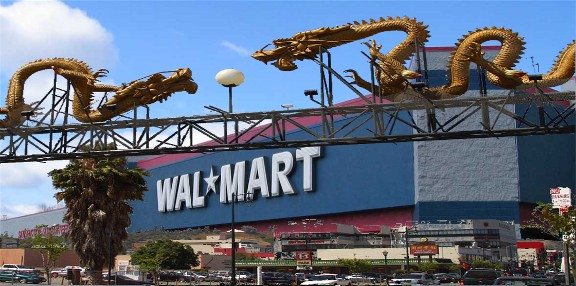

The Asian Pacific American Labor Alliance (APALA), the Los Angeles Alliance for a New Economy (LAANE) and other community groups took legal action against the proposed Chinatown Walmart today by filing a lawsuit against the City of Los Angeles. The lawsuit challenges the process by which the building permits were issued.
The plaintiffs allege that the Department of Building and Safety violated city and state laws which require public approval of the permits by the Community Redevelopment Agency/LA board. Eighty Chinatown residents, Walmart workers and community activists rallied the same day to adopt principles for all development in Chinatown and demand that the community’s voice be heard.
The Asian Pacific American Labor Alliance, with the support of LAANE and Chinatown small businesses, filed multiple appeals against the permits when the store was first proposed in February 2012. The appeals asserted that the permits received inadequate review and were erroneously issued,
» Read more about: Community Groups Sue City Over Chinatown Walmart Permits »
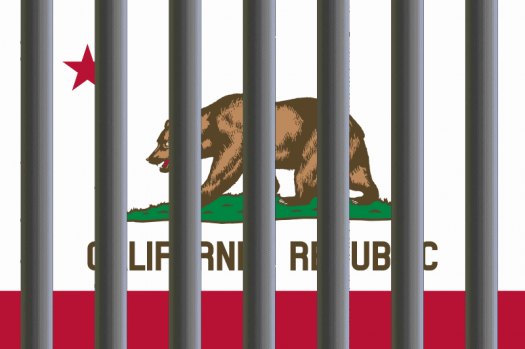
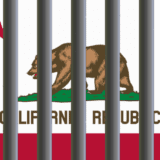
As California grapples with a prison system so broken that the U.S. Supreme Court has mandated reductions in the number of prisoners it holds, the three-part “Smart Justice: Rethinking Public Safety in California” discussion begun this past week at the University of Southern California is examining both consequences and possible solutions to the state’s mass incarceration mess.
Moderated by Tomás Rivera Policy Institute director Roberto Suro, the first session—titled “California’s Corrections Systems and the Lives They Impact” and organized by Californians for Safety and Justice and USC’s Students Talk Back program—featured presentations by James Austin, president of the JFA Institute and author of a ground-breaking report on reducing prison populations, Susan Burton, former inmate and founder of A New Way of Life Reentry Program, and USC graduate students Emily Reisner and Jennifer Moore.
A New Way of Life
“Each time I got out of prison,
» Read more about: Ending California’s Incarceration Quagmire »


How did the Los Angeles Metro recently leverage the purchase of 550 clean-fuel buses to create 200 U.S. manufacturing jobs?
What will it take to link the billions of federal dollars used for transportation investments to domestic job creation?
To begin addressing these questions, Living Cities invites you to join a webinar April 10 about the Transportation and American Jobs Project, a national effort to ensure that transportation investments using federal funds create quality jobs for American workers. Specifically, the webinar will provide an overview of the U.S. Employment Plan (USEP), a model transit procurement program which incentivizes investments in domestic manufacturing jobs. This innovative model has the potential to have significant economic impact in the rebuilding of the U.S. manufacturing sector. Speakers will include Professor Manuel Pastor, from the Program for Environmental & Regional Equity (PERE) at USC, and Madeline Janis,
» Read more about: Living Cities’ Invitation to a Job Creation Webinar »
It’s hard to present the history of a social movement without giving the impression that all the exciting fights have already been won and that taking action now is irrelevant. Sometimes the activists of the past suggest they knew more than they did at the time, and were unique in their ability to organize and take risks. All of this can make for boring documentaries and a pomposity that’s off-putting to anyone born after the action being described.
Somehow Feminist: Stories from Women’s Liberation 1963-1970, a new film by Jennifer Lee, avoids these fatal flaws. By including her own personal awakening to 1960s feminism through the making of the film, Lee opens a window onto a movement that feels almost as new and exuberant as that early movement did.
Conditions for women in 1963 were unimaginably strict and confining (Lee refers to sex-segregated want ads as emblematic of the period),
» Read more about: Film Review: “Feminist: Stories from Women’s Liberation” »


 The whining from some fast food chains that they won’t be able to afford paying for their employee’s health coverage under Obamacare has gotten a lot of press. But what is more troubling is the recent news that some big chains are concluding that the costs won’t be nearly as high as they had projected. The reason: their employees won’t be able to afford the health insurance and will instead pay a fine and remain uninsured. This fight is just the first battle in the coming war over Obamacare that will center on those who get left out. Big flaws in the bill will mean that many low-wage workers will be forced to choose between paying huge chunks of their income on premiums or on a penalty that leaves them with no coverage at all. Reformers should take note and get ready for the coming struggle.
The whining from some fast food chains that they won’t be able to afford paying for their employee’s health coverage under Obamacare has gotten a lot of press. But what is more troubling is the recent news that some big chains are concluding that the costs won’t be nearly as high as they had projected. The reason: their employees won’t be able to afford the health insurance and will instead pay a fine and remain uninsured. This fight is just the first battle in the coming war over Obamacare that will center on those who get left out. Big flaws in the bill will mean that many low-wage workers will be forced to choose between paying huge chunks of their income on premiums or on a penalty that leaves them with no coverage at all. Reformers should take note and get ready for the coming struggle.
Last week, the Wall Street Journal reported that Wendy’s lowered its estimate of the cost of Obamacare for each of its restaurants by 80 percent,
» Read more about: Obamacare: Not So Fast for Fast-Food Workers »